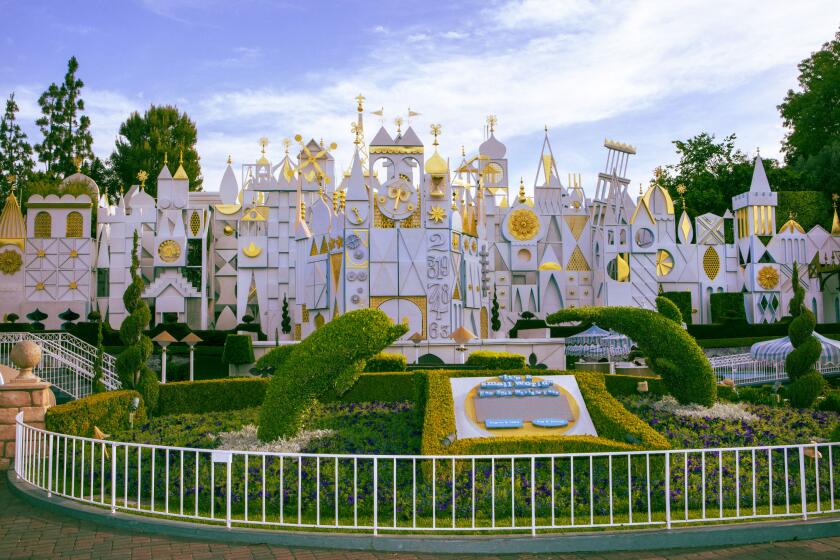African Beat Sets Pace for Kwanzaa Festival Parade : Black Culture: Annual harvest celebration draws crowds to Crenshaw Boulevard route.
- Share via
The year marched out to a different beat--a distinctively African-sounding one--for Gregory Ramey on Saturday.
The Los Angeles resident took off early from work to attend his first Kwanzaa festival and parade.
The nearly two-mile processional along Crenshaw Boulevard in Southwest Los Angeles drew about 10,000 spectators who watched more than 1,000 marchers celebrate an African-American observance of culture and unity.
“This is my first one, but it won’t be my last,” said Ramey, a cable television installer, as he watched a spirited 22-member drill team called the Watts Troopettes execute a precision close-order drill to the beat of drums.
“I may start observing Kwanzaa in my home. I’ll definitely be back here for sure next year. Nothing will stop me.”
Kwanzaa organizers say their harvest festival-type celebration has gained a steady following during the 13 years the parade has been staged in Los Angeles.
Kwanzaa itself was created in 1965 by American black activist Maulana Karenga as a way of promoting black pride.
Many of those marching Saturday and those lining Crenshaw to watch were dressed in colorful batik African gowns. The parade ended at Leimert Park, where reggae, rhythm-and-blues and jazz musicians performed and vendors offered African masks, jewelry and art objects in booths set up on streets.
“Kwanzaa doesn’t take the place of Christmas,” said Cynthia McCall, who was selling candles, candy, fruit and needlepoint pictures that chronicled the seven principles of Kwanzaa. They are unity, self-determination, collective work and responsibility, cooperative economics, purpose, creativity and faith.
Private family celebrations utilize symbolic straw mats and stalk-like candleholders. An ear of corn symbolizes offspring, drinks are offered from a ceremonial unity cup in honor of ancestors and gifts are exchanged.
One candle is lighted daily during the seven-day observance. Public lighting ceremonies were held starting Dec. 26 at various locations in South-Central Los Angeles and will continue through Monday.
Sixty-five marching units and vehicles took part in the parade, which was led by two veteran black community activists who had been named this year’s Kwanzaa king and queen.
Celes King III, 67, a bail bondsman who secured the release of more than 5,000 jailed civil rights workers in the South during the 1960s, was king. Arlillian Moody, 75, a dressmaker and owner of a West Adams-area social center, was queen.
“This parade started out as nothing and keeps getting bigger and bigger and better,” said Barbara Calhoun, a Los Angeles traffic officer on duty on Crenshaw Boulevard for her third parade. “You see so much natural talent in the young people in the parade.”
Three-year-old Brittany Fox was bouncing up and down to the beat of a drum corps that accompanied a school drill team. She asked her aunt, Desiree Speller, when she would be old enough to march.
“I told her she has to study hard and be good if she wants to be in this parade,” Speller explained. “Events like this teach children early to do the good things in life.”
Nearby, Arthur Crout, 9, paused from racing a radio-controlled car around a supermarket parking lot to watch the parade go by.
“I like the army men the best,” Arthur said, pointing to a group of youngsters marching past in camouflaged green fatigues. The signs they carried identified them as “Allah’s Army,” a group of “anti-drug, anti-gang rappers.”
Ahead of them, traveling behind a banner that read “Self Determination,” marched Jesse Al-Uqdah, 64. He used crutches to compensate for his missing right leg. “This is a beautiful day,” said Al-Uqdah, a retired food services worker.
A vendor who said his name was Sonlight East worked the parade crowd with a shopping cart bearing lithographed T-shirts carrying an anti-gang message: “Stop the War Between Brothers.” East apologized to his customers for being out of Kwanzaa shirts.
More to Read
Sign up for Essential California
The most important California stories and recommendations in your inbox every morning.
You may occasionally receive promotional content from the Los Angeles Times.











